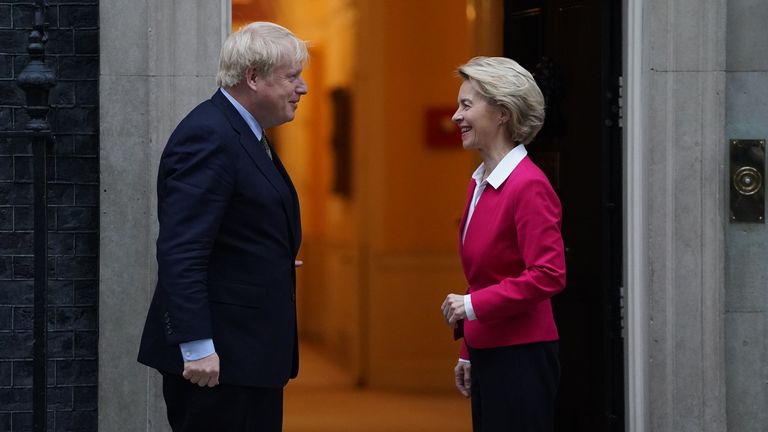When Boris Johnson arrives for dinner in Brussels, he will be welcomed to the headquarters of the European Commission - the giant concrete X known as the Berlaymont.
It is a building he knows well, from his years as a journalist based in this city, reporting on the foibles of the European Union.
In those days, the prime minister used to write lurid stories of EU excess for The Daily Telegraph; now he returns to oversee one final push for a trade deal worth untold billions.
When the Brexit saga began, the European Commission was overseen by Jean-Claude Juncker, a president of international renown. Mr Juncker had previously been the long-standing prime minister of Luxembourg; he was confident and gregarious.
His successor, German Ursula von der Leyen, is cut from a different cloth - hard-working and diligent but also, by comparison to Mr Juncker, a much less colourful figure.
Mrs Von der Leyen was previously Germany's defence minister - a big job, certainly, but not a globally recognised one.
Before her came a long line of men (yes, all of them men), who had been prime ministers, finance ministers or party leaders. "She is a technocrat, not a leader," said an underwhelmed diplomat to me.
Mrs Von der Leyen, according to a variety of sources I have spoken to, is keen to establish herself on the world stage with a "political win".
The COVID recovery plan that she championed ended up causing ructions; the European budget is being held up by a different row. Her green vision for Europe has been overtaken by the focus on the pandemic.
So could she end up taking the credit for orchestrating a Brexit deal in search of that win?
Well, those diplomats suggest two things - firstly, that they think the European Commission president is much more open to the idea of compromise than her chief negotiator, Michel Barnier.
And secondly, crucially, that plenty of member states don't share the opinion. The French, for instance, believe that Mr Barnier has already given up enough, if not too many, concessions to the British.
The Dutch, Belgians and Danes are all dubious. Even countries towards the east of Europe, who are completely untouched by the niceties of English Channel fishing, are beginning to go cold, with one diplomat telling me that "we think no deal would be better than giving away anything more".
The brutal truth is that, even if she did create some kind of compromise, Mrs von der Leyen has no power to force it through.
That will require the backing of national leaders, who, by happy coincidence, meet in Brussels on Thursday.
Nobody is really expecting Mr Johnson and Mrs von der Leyen to sort Brexit over dinner.
The aim is to provide some impetus, to stimulate one final bout of purposeful negotiations, perhaps to spot some of the much talked-about landing zones.
But the differences remain yawning, based on fundamental disagreements that have become apparent during months of negotiation. There is, among the Brussels cynics, not just a doubt about whether Mrs von der Leyen can produce meaningful movement, but also a fear that the whole idea of the dinner is a PR stunt, dreamt up in Westminster.
"I suspect they want Boris to come to Brussels, be seen to try, and then come home claiming that he'd done his best, but got nowhere," said another EU source.
"My fear is that von der Leyen wants to do something - anything - and hasn't spotted the trap."
Optimism, it is fair to say, is not running high, even if hope remains.
"The road to compromise is narrow," one diplomat told me, "and we are running out of time and patience."





